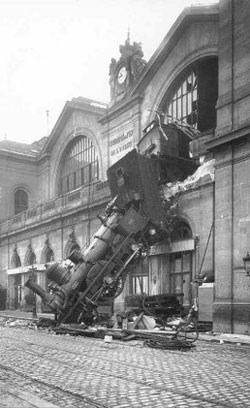The City of Sault Ste. Marie is building up steam to join the fight to save a rail line from here to Sudbury.
After hearing tonight from Bill Therriault, chair of the City's multi-modal steering committee, City Council directed Chief Administrative Officer Joe Fratesi to contact major industries and identify their intentions for the Huron Central Railway-operated feeder line.
Fratesi will work to initiate a co-ordinated private-sector approach to saving the line while Mayor John Rowswell works with other affected communities.
The multi-modal steering committee will offer logistical support.
Therriault told councillors tonight that the committee has identified that rail line as being essential to the economic and environmental stability and growth of Northern Ontario.
It's also a key component of the City's multi-modal plan: the part that involves the planned transfer of goods from rail containers to be distributed by truck into the United States and Southern Ontario.
That part of the plan sees Sault Ste. Marie being developed as a major reload and distribution centre and taking a large burden of traffic off the shipping corridor that passes through Southern Ontario and into the United States.
Shortly before the global recession, consultants identified the multi-modal plan as a viable alternative to a shipping corridor that was already trying to function beyond its capacity, serving a market that had an appetite for goods that could support a second shipping corridor to capacity.
"We have to be realistic," said Therriault in an interview after his presentation to City Council.
"If you look at the world today, the container traffic is down at least 20 percent internationally, rail traffic is simply down a good 20 percent and the likelihood of having multi-modal today with this economic climate is not probably all that realistic," he told members of the media.
"Having said that, the [multi-modal feasibility study] pointed out that this was a strategic opportunity that existed in the conditions as they were a year-and-a-half ago and undoubtedly it will exist again in the future."
In that study, KPMG said the feeder line from Sault Ste. Marie to Sudbury, owned by Canadian Pacific and operated by Huron Central, would best lend itself to multi-modal-related development.
With Huron Central's announcement on June 16 of its intent to abandon operations and its contract with CP on that line, the rail-to-truck part of the multi-modal plan has been thrown into limbo, Therriault said.
And the issue is much bigger than that.
Without that feeder line, the very economic survival of communities along it have been thrown into question, he said.
While multi-modal could bring economic growth and stability to the region, that line is necessary to maintain what economic stability currently exists in the Sault and those communities along the line.
If that line is abandoned and not maintained, it will soon deteriorate to the point that it is prohibitive to repair and be lost.
To construct another in its place would be almost impossible.
That's why City Council and the multi-modal steering committee have asked Fratesi to become involved on behalf of the City and to help the mayor try to save the line.
"There have been many things in the past several years that have not been traditionally municipal responsibilities," Fratesi said after tonight's City Council meeting.
"Health care, hospitals, doctor/physician recruitment," he said. "Those kinds of things are all new for us but we need to do, as municipalities, what we need to do to survive. And economic development is very important to all of the communities who have relied for the last several years on the CN rail for product to be moved to market."
Fratesi said that if the feeder line from the Sault to Sudbury is closed by Huron Central Railway, as it says it plans to do, a lot of industries in the Sault and points between here and Sudbury will be facing a one-alternative transportation method to move their goods to the main transcontinental east-west rail line run by Canadian Pacific.
That alternative, the highway, will be more expensive for everyone, less environmentally friendly and much less attractive for businesses thinking about growing their production or moving it here.
Some of the local companies Fratesi says he will likely be talking to include Essar Steel Algoma, Domtar (Sault and Espanola), Boniferro Mill Works, Purvis Reload Centre, St. Marys Paper and Flakeboard.
"Up the line I don't know who the players are at this point," the CAO said. "Obviously Espanola relies greatly on this rail line and their whole town may very well be based on whether or not there's a way of getting product out."
Fratesi said now is not the time for blaming.
Instead, his intent is to try to bring all the players together to try to find a workable solution.
"Get people to the table, see what the appetite is for finding a solution to the problem and start talking about and brainstorming what those solutions might be," he said. "There may or may not be an operator that can be found or created."
Fratesi and Rowswell have less than eight weeks until Huron Central plans to send its last train from the Sault to McKerrow.
As reported earlier by SooToday.com, Genesse & Wyoming Inc., parent company of Huron Central, announced last week that the company will cease its freight operations from the Sault east to McKerrow by August 15.
The company said operations from McKerrow to Sudbury will grind to a halt by October 31 and at least 20 jobs in the Sault will be lost.
